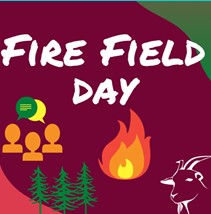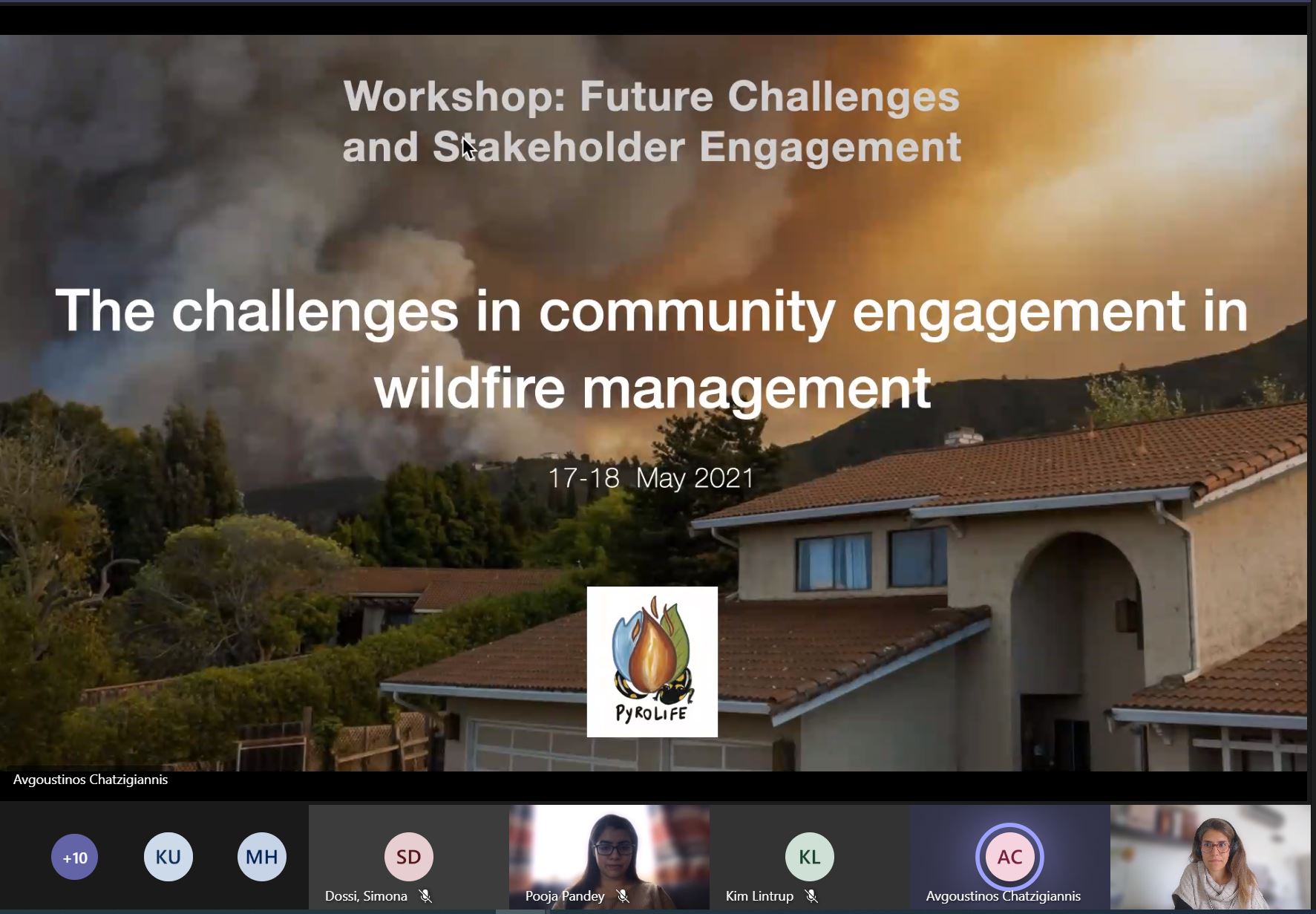Introduction
Wildfire challenges across Europe and the world require more and better coordination between scientists and stakeholders in order to give effective solutions to diverse needs. The second PyroLife workshop consisted of a two-day interactive event. On the first day, a variety of stakeholders presented interests and challenges in wildland fire, and engaged in discussion with Early Stage Researchers (ESRs); ESRs then discussed and presented their findings on the second day, completed group reflections, and defined future action steps. The objective of the workshop was to explore methods to make collaborations more efficient and to jointly design processes and products that help address wildfire risk challenges. An array of experts and stakeholders presented on diverse aspects of fire management and geography: from societal engagement, emergency response, conservation, and land management, co-production with stakeholders, to sustainable land management. All experts focused on the European context and presented case studies from both temperate and southern Europe. This article presents a summary of the workshop; outlining the speakers, identified challenges, discussions, activity, and outputs.
Stakeholder Speakers
The following table summarises all the speakers who attended, their affiliation, and the topic and geographic area they presented on. Interactive discussions followed the presentations.
| Name | Affiliation | Topic (Country) |
| Kim Lintrup | FireAid | Nordic fire management (Denmark) |
| Avgoustinos Chatzigiannis | Fire Safety Training Providers | Mediterranean fire management (Cyprus) |
| Fabio Silva | Special Civil Protection Force | Societal engagement on risk Management (Portugal) |
| Sarah Bunce | Thames Basin Heaths Partnership | Conservation and land management (UK) |
| Rob Gazzard | Forestry Commission | Design process of solutions for stakeholder engagement |
| George Boustras | CERIDES | Best practices for the engagement of stakeholders in risk management (Cyprus) |
| Gareth Clay | UK Wildfire Research Group | Strategies to learn from each other (UK) |
| Iago Otero | University of Lausanne | Mediterranean/Alpine examples of Co-production (Switzerland) |
| Pedro Herrera | Entretantos | Sustainable landscape management (Spain) |
Key take-aways from presenters
All presenters were asked to identify key challenges in their field related to fire and posed a question directly to ESRs, as to where research is needed to fill in gaps. Both the challenges and opportunities for action are many, including risk perception and awareness, capacity building and empowerment, communication, capacity to influence policy, education, resources needed for implementation, and uncertainties in fire management. Figure 1 (created by ESR 15 Isabeau Ottolini) summarises a few of the questions and discussions that emerged.

Figure 1: Stakeholder challenges and questions
Group Activity
Following the speaker presentations and discussions, the ESRs split into two breakout groups. Each group decided on one or more stakeholder challenges to focus on and worked to answer a series of questions. They aimed to address how their research can produce or assist a specific product that serves the chosen stakeholder needs. Next you can read and download the results of this activity.
Group 1: Reframing research to bring “final users” to the forefront
In many research projects, “final users” are often not engaged throughout the research process, and impacts are discussed only in academic journals. By flipping this research approach to bring “end users” first, the following challenges can be avoided:
- Research outputs not actually aligned with stakeholders’ needs/wants
- Research outputs not translated in a way stakeholders can engage and utilize
Engaging with “final users” alongside the development of research objectives is closely intertangled with research funding. We need to both think about stakeholder engagement when designing research proposals and equally incentivize more of a co-production style of engagement in funding calls to enable effectively, intentional collaboration at this stage.
 The second ESR group engaged in a creative brainstorming discussion since their individual research projects reach many different directions. They came up with the concept of “Fire Field Days” to address stakeholder engagement challenges: this annual networking event could present an opportunity for continuous stakeholder engagement (rather than a top-down informative approach) through repeated annual activities, building strong networks between public-private partnerships and research, and establishing connections to local landscapes while encouraging (inter)national cooperation. Fire Field Days can create a context that is both relevant for research and appealing for local people, helping form long-lasting partnerships. Through such a network and ensuing events, we can move away from single “silver bullet” solutions and help develop a toolbox that can be applied in different ways in different territories.
The second ESR group engaged in a creative brainstorming discussion since their individual research projects reach many different directions. They came up with the concept of “Fire Field Days” to address stakeholder engagement challenges: this annual networking event could present an opportunity for continuous stakeholder engagement (rather than a top-down informative approach) through repeated annual activities, building strong networks between public-private partnerships and research, and establishing connections to local landscapes while encouraging (inter)national cooperation. Fire Field Days can create a context that is both relevant for research and appealing for local people, helping form long-lasting partnerships. Through such a network and ensuing events, we can move away from single “silver bullet” solutions and help develop a toolbox that can be applied in different ways in different territories.
Outputs & next steps
After two enriching days, the momentum from the stakeholder engagement workshop does not stop here. Inspired by the presenters and ensuing discussions, ESRs will work to compile guidelines and resources for PyroLife and other PhD students regarding stakeholder engagement processes. We aim to develop this during the next PyroLife course on social sciences (fall 2021). In the mid-term, we also aim to create a shared space for literature on stakeholder engagement approaches in research. As stakeholder engagement is a continuous process, we have a few long-term goals: to host an online “open house” for stakeholders, perhaps as part of the final PyroLife conference, and to also develop indicators regarding engagement which we will review at the end of the project. And perhaps, after over a year of pandemic-induced isolation, we can allow ourselves to dream of a joyous occasion inspired by Fire Field Days in the future, engaging with stakeholders with our feet on the ground.

